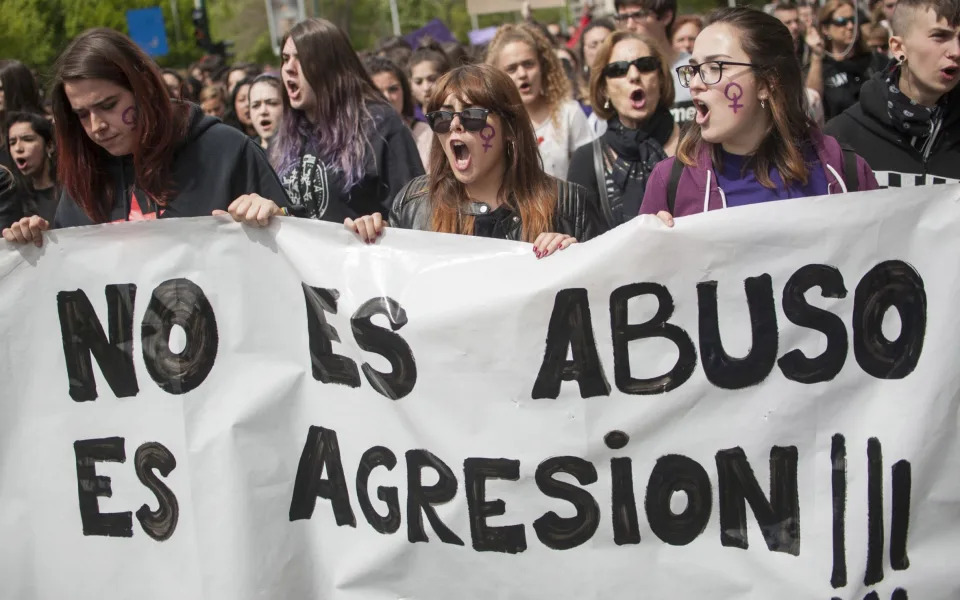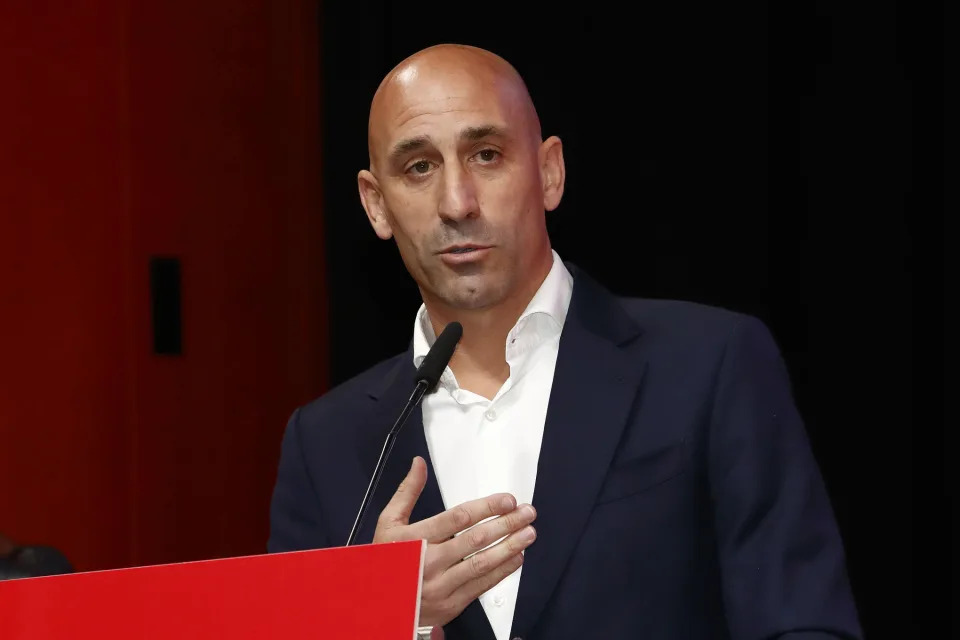(AP Photo/Alessandra Tarantino, File)
Laura Marqués has never been much interested in soccer. She doesn’t watch the Spanish league games or know the names of the players. She didn’t even watch the Spanish women’s team win the World Cup final this month. But after the president of Spain’s soccer federation forcibly kissed one of the players during the medals ceremony after the match, setting off a momentous national debate about feminism, equality and abuse, soccer is all she has been thinking about.
“We’ve been talking about soccer a lot this week,” Marqués, a 26-year-old lawyer, said as she walked in downtown Zaragoza with a friend. She said she considered the unwanted kiss an all-too-common act of casual aggression, an abuse of power by an authority figure and a shameful eclipsing of the women’s moment of glory by the country’s stubborn, if fading, culture of machismo, the often ingrained sense of masculine pride and entitlement.
“Everything that happened showed what the players have been complaining about for a long time, and nobody believed how serious it was,” she said. “It’s the straw that broke the camel’s back.”
Sign up for The Morning newsletter from the New York Times
The celebratory and nonconsensual kiss on the lips that Luis Rubiales, the president of Spain’s soccer federation, pressed on Jennifer Hermoso, one of the team’s star players, has come to embody the generational and cultural fault line between deep traditions of machismo and the more recent progressivism that has put Spain in the European vanguard on issues of feminism and equality. Some commentators have taken to calling it Spain’s #MeToo moment.
On Monday, Spanish prosecutors said they had opened a preliminary investigation into whether Rubiales, 46, could be charged with committing a crime that could constitute sexual aggression. The group he heads, known formally as the Royal Spanish Football Federation, met for hours on Monday and into the night to discuss the issue, before calling on him to resign. In a statement, it cited “the unacceptable behaviors that have seriously damaged the image of Spanish football.”
Against the politically charged backdrop of recent Spanish elections that largely rejected the nostalgic and anti-gender identity politics of the chauvinistic far right, Spain’s establishment is clearly picking a side. Leading politicians on the left and right, the country’s top cultural figures and even an increasing number of voices from within the machismo culture of Spanish soccer have rallied to support Hermoso — who said she felt like a “victim of aggression” after a nonconsensual and sexist act — and to condemn Rubiales, who has decried “false feminism,” described himself as the victim of a “social assassination” and insisted Hermoso initiated the exchange.
“What happened last week was an epochal moment that will have important repercussions,” said Máriam Martínez-Bascuñán, a professor of political sciences at the Autonomous University of Madrid. She said the immediate condemnation of Rubiales — even by members of Spain’s main conservative party — reflected how far the country’s feminist movement had come. She noted that in the last 20 years, Spain had been a pioneer in gender and equality legislation.
In 2004, it recognized domestic violence as explicitly gender-based violence, and in 2022, after a horrific gang rape, the government passed a law that classifies any nonconsensual sex as rape.
The backlash to the kiss by Rubiales, Martínez-Bascuñán said, showed that the country has no intention of backsliding.
Martínez-Bascuñán said the incident presented “a magnificent opportunity” for Spain’s feminists and progressives to reveal and change the sexism in even the most male-dominated institutions. She said that there was a “generational and gender-based” fault line, but that most Spaniards understood why the kiss was inappropriate, and those who did not understand “were not the majority at all.”
Indeed, the denunciation of the kiss, videos and photographs of which proliferated in Spanish social media and across the country’s newspapers and television screens, came from across the political spectrum.
Pedro Sánchez, the country’s acting prime minister and leader of the Socialist party who bet big, and successfully, on his own record of progressive and feminist upheavals in last month’s elections, said that the kiss was “unacceptable” and the subsequent apology by Rubiales was “not enough.”
Irene Montero, the acting minister of equality, described the kiss as “sexual violence,” a statement that prompted Rubiales to threaten to sue her and other left-wing politicians for defamation.
Cuca Gamarra, the secretary of the conservative People’s Party, described the kiss as “shameful.” Isabel Díaz Ayuso, the regional president of Madrid, who is widely seen as a potential conservative prime minister, called it “disgraceful.” An editorial published on Saturday in La Razón, a conservative newspaper, described the episode as a “national monstrosity,” and said the progressivism of Sánchez’s government had created an environment that enabled Rubiales and his “vulgar and inappropriate behavior in the Women’s World Cup final.”
The far-right party Vox, which tanked in the election after portraying laws against gender-based violence as biased against men, has remained silent.
But Spanish society has erupted, seizing on the incident as a major moment of reckoning for its clubby and often sexist soccer culture. More than a dozen female players rebelled last year, long frustrated with unequal pay; what they considered overly harsh and controlling treatment by their current coach, Jorge Vilda, including allegations that he rifled through their personal belongings; and a general culture of sexism.
Many were kicked off the team and missed the World Cup, but one of those players, Lola Gallardo, told the newspaper El País on Monday that it was worth the pain of missing the glory. “Ideas are ahead of a medal,” she said.
The entire team and dozens of other players signed a joint statement late Friday saying they would not take the field to play for Spain “if the current managers continue.”
On Saturday, some of the members of the team’s coaching staff resigned, condemning Rubiales’ defensive response to the incident. Two of the women who signed the resignation letter sat in the front row at a Friday news conference where Rubiales announced he would not step down. They later said that they had been told to sit there in a forced show of support, but did not say by whom.
The players are seeking to end the days of machismo in Spanish soccer, and seal it with Rubiales’ kiss.
“It’s over,” Alexia Putellas, a star player, wrote in a post on X, formerly known as Twitter, expressing solidarity with Hermoso. At a Spanish league match in Seville on Sunday night, the home players came on to the field wearing shirts reading “It’s over.” The crowd roared in approval and chanted calls for the resignation of Rubiales and for the federation to be scrubbed of corruption.
On Friday, Misa Rodríguez, a player on the national team, posted on social media a cartoon of a little girl asking her grandmother to tell her about how the team won the World Cup. “We didn’t just win the World Cup, little one,” the grandmother answers. “We won so much more.”
Lola Índigo, a Spanish singer, stopped a concert in Marbella to express indignation at the men who gave Rubiales a standing ovation after Rubiales’ speech on Friday.
But while the condemnation of Rubiales has been nearly uniform in politics, media and public life, there remains throughout Spain those who wonder if the incident was as bad as it was being made out to be, or if Rubiales’ lips are too thin to hang a movement on.
“If they want to get rid of him for what he did before, then they should, but the kiss is nonsense,” said Beatriz Pena, a 55-year-old soccer fan who was shopping for her grandson at her local soccer team’s store. “It’s not sexual harassment or anything.”
Oscar Duarte, 48, bought a soccer shirt for his son on Monday, the same day that Rubiales’ mother locked herself in a church and began a hunger strike to protest what she considered to be a witch hunt of her own son. Duarte said he and his son had made sure to support the women’s team, watching the games and cheering the players’ victory during the final match.
Like many Spaniards, Duarte was bothered that Rubiales grabbed his crotch in the vicinity of the Spanish queen and princess during the victory celebrations, but said he didn’t see anything so terrible about the kiss.
“It’s like a kiss I could have given to a friend,” he said, adding that it “was just a gesture of affection.”
But on Monday, Spanish prosecutors began looking into whether it was much more than that.
c.2023 The New York Times Company
Why one kiss caused an eruption of Spanish anger – and an anti-feminist backlash
Rosa Silverman
THE TELEGRAPH
Mon, August 28, 2023

Spain's gender politics
It might have been a straightforward national triumph. When Spain won the Women’s World Cup, beating England’s Lionesses in last weekend’s football final, the mood in the country was jubilant. England’s defeat notwithstanding, there was a sense here, too, of pride in how far we had come.
But progress is not always linear, and what was almost an uncomplicated narrative – of another major stride forwards in gender equality – has been overshadowed in Spain, and beyond, by a bitter row over a kiss bestowed by Luis Rubiales, the 46-year-old president of the Spanish football federation, upon Spain’s leading women’s goalscorer, Jenni Hermoso.
The 33-year-old footballer has said the kiss was not consensual, and an internal investigation has been launched by the football federation. Rubiales, who has been suspended, has claimed he is the victim of a witch-hunt by “false feminists”.
The resulting storm has been characterised as Spain’s MeToo moment. “We are with you Jenni” has been trending on social media, along with the phrase “se acabó”. Translation: enough is enough. But the outpouring of anger is in fact a flare-up in an ongoing battle over gender politics in Spain.
Recent years have seen the rapid transformation of a patriarchal, macho society into one of Europe’s most feminist. This change, however, has been accompanied by a corresponding anti-feminist backlash from those who feel women’s progress has gone too far.
In the European Union’s 2022 Gender Equality Index, Spain was ranked as the member state with the sixth best score. This followed a series of recent legislative changes, with the Left-wing government rolling out a consent-based rape law, statutory menstruation leave and a parity rule for public bodies and companies, among other progressive measures.
It has been a remarkable turnaround for a country that was still a dictatorship less than 50 years ago, with what critics describe as a longstanding culture of “machismo”.
Under the regime of Francisco Franco, who ruled until his death in 1975, conservative Catholic values were venerated and a form of traditional femininity held up as the ideal, with women expected to play their “natural” role of wives and mothers in the home.
If they wished to work, they needed the permission of their father or husband. “Women could not take the power of men and women could not get angry,” says Nuria Capdevila-Argüelles, professor of Hispanic studies and gender studies at the University of Exeter.
While there were feminist movements agitating under Franco, it wasn’t until the country transitioned to democracy, from 1975, that major breakthroughs were made. Adultery was only decriminalised in 1978, divorce in 1981 and, in 1985, abortion in cases of rape or physical damage to the mother or infant was legalised.

Francisco Franco governed Spain from 1939 to 1975; under his dictatorship a form of traditional femininity was held up as the ideal - AFP/Getty Images
By comparison, adultery has not been a crime in the UK since 1857, when the Matrimonial Causes Act also allowed ordinary people to divorce. The Abortion Act in 1967 legalised abortion in the UK under certain conditions in 1967.
“Spain entered the modern era without having undergone the bourgeois revolutions of the 19th century,” says Rosa San Segundo, director of the University Institute for Gender Studies at the Carlos III University of Madrid.
“The Second Republic [1931-39] was at the vanguard of intellectual and feminist thinking of the time, but this was snuffed out by the Franco regime. But with the arrival of democracy, feminism became very organised.”
In the mid-2000s Prime Minister José Luis Rodríguez Zapatero declared himself “not just anti-machismo” but “a feminist”. Even, in an interview with the New York Times in 2004, a “radical feminist.”
“Zapatero introduced ground-breaking legislation in the fields of equality and gender violence and this helped to create an extensive body of activist consciousness,” says San Segundo.

Prime Minister José Luis Rodríguez Zapatero described himself as a ‘radical feminist’, but the advancement of feminism in Spain has not been straightforwardly linear - Karel Navarro/AP
After 2016, this consciousness took on a new momentum. In the early hours of July 7 that year, an 18-year-old woman who found herself alone on Plaza del Castillo in Pamplona, during the week-long running of the bulls festival, was raped by a gang of five men.
Known as the Wolf Pack case, after the name of the men’s WhatsApp group, this notorious episode saw hundreds of thousands of supporters of women’s rights take to the streets to protest against both the sexist cultural backdrop to the crime and its treatment by a judicial system that critics claimed did not take such offences against women seriously.
The men were controversially sentenced to nine years in jail for sexual abuse but acquitted of rape. Spain’s Supreme Court later reversed the verdicts and sentenced them to 15 years for rape.
The outraged response to the crime and initial verdict did not stop at street protests. Following the men’s conviction in 2018, women in Spain started posting their own stories of harassment on Twitter, accompanied by the hashtag #cuentalo, meaning “tell it”.
The coalition government took legislative action, too, but not without controversy. Last year, the new consent law was introduced, spearheaded by equality minister Irene Montero from the Unidas Podemos party.

Women hold banners reading 'it is not abuse, it is assault' during a demonstration against the verdict of the 'La Manada' (Wolf Pack) gang case - Gari Garaialde/Getty Images)
Known as “solo sí es sí” – or “only yes means yes” – the law stated that consent must be affirmative and cannot be assumed to have been given. It also, crucially, scrapped the distinction between the crimes of sexual abuse and sexual aggression, or rape. Previously, the latter – which involved the use of violence – carried heavier sentences.
But an unforeseen problem with the new legislation emerged: after it was passed, hundreds of previously convicted offenders were able to have their sentences reduced in line with the new sentencing guidelines, which could be applied retrospectively (something the Spanish legal system, as well as others, allows).
The wave of criticism this generated was seized on by vocal anti-feminists, who have risen in the shadow of Spain’s feminist revolution: opponents of the progressive remaking of Spanish society, who throw around the word “feminazi” and warn about women making false accusations against men.
There has also been annoyance about an app unveiled by the government in May to enable women to audit their husband’s housework and ensure chores are equally shared in a country where men typically do far less housework and caring.
A survey last year by Spain’s National Statistics Institute found 45.9 per cent of women performed the majority of domestic chores compared with 14.7 per cent of men.
The political wing of this movement in Spain is embodied by the far Right party Vox, which achieved success in the polls both regionally and nationally after 2018. As well as opposing regional separatism, Vox has led a fightback against so-called “gender ideology.”
As part of this, it has sought to reclassify domestic violence as “intra-family violence”, denying the existence of gender violence. It has also vowed to sweep away Spanish abortion laws and LGBTQ+ rights. This backlash has not been contained within the country’s borders.
An Ipsos UK survey of 32 countries for International Women’s Day this year found 54 per cent felt things had gone far enough in their country when it came to giving women equal rights with men – a gradual increase since 2019.
In Spain, notably, this figure was 72 per cent, the highest proportion of all the European countries surveyed.
“We are seeing an international backlash against feminism, from [former president] Donald Trump in the US to Brazil’s [former president] Jair Bolsonaro and parts of the far-Right in Europe,” says San Segundo.
There are signs, however, that in Spain this sentiment has perhaps already peaked. The country’s snap general election last month saw Vox lose support, with its vote count falling from 15 per cent in 2019 to 12 per cent, and its representation in parliament declining from 52 to 33 seats.
Although, as Prof Capdevila-Argüelles says, “there will always be voices against feminism,” support for the party’s extreme positions appears to be less widespread than it might have hoped.
Montero has, meanwhile, been defiant. “This is what happens when the feminist movement advances,” she told Time magazine earlier this year, in the wake of personal attacks on her.
“It’s a continuous strategy of harassment and tearing you down, of scrutinising your private life with the intention, in the end, to make it so it’s no longer worth it for the women who are temporarily at the forefront to continue.”

More than 5,000 high school and university students demonstrated against the controversial sentence in the wake of the rape of a young woman in Pamplona by five men
- LightRocket via Getty Images
The ongoing football scandal might be seen as another indicator of where public opinion in Spain now lies, with a vocal majority uniting behind Hermoso, leaving Rubiales looking increasingly isolated.
“The discourse of equality has seeped into Spanish society. People can see that this is abuse of power,” says San Segundo. “Thirty years ago we encountered this kind of person and behaviour in all spheres, such as in academia.
“Now football has been shown to be one of the last vestiges of that world. I think it’s very positive that the poor conditions and harassment that sportswomen endure has been brought to light. Women have been made aware and said ‘enough of this toxic masculinity’.”
Mother of beleaguered Spanish soccer chief starts hunger strike as calls mount for his resignation
BY CIARÁN GILES
Updated Mon, August 28, 2023 a



RubialesThe president of the Spanish soccer federation Luis Rubiales speaks during an emergency general assembly meeting in Las Rozas, Friday Aug. 25, 2023. Rubiales has refused to resign despite an uproar for kissing a player, Jennifer Hermoso on the lips without her consent after the Women's World Cup final. Rubiales had also grabbed his crotch in a lewd victory gesture from the section of dignitaries with Spain's Queen Letizia and the 16-year old Princess Sofía nearby. (Real Federación Española de Fútbol/Europa Press via AP)
MADRID (AP) — The mother of the Spanish soccer federation president under fire for kissing a Women’s World Cup champion on the lips started a hunger strike Monday in defense of her son as calls grew for his resignation and prosecutors opened a preliminary investigation.
The leaders of the regional soccer bodies that make up the Spanish federation added their call for soccer chief Luis Rubiales' resignation on Monday. FIFA, the world soccer body, had already provisionally suspended him for 90 days after he gave a defiant speech refusing to step down.
The scandal surrounding the kiss — and Rubiales’ refusal to accept Jenni Hermoso’s insistence that it was not consensual — has overshadowed the Spanish team's 1-0 victory against England in the Women's World Cup final. Spain's national team players said last week they would not play any more games unless Rubiales resigns.
Rubiales also came under a storm of criticism for grabbing his crotch in a victory gesture while in the presidential box near Spain’s Queen Letizia and her teenage daughter, Princess Sofia.
Rubiales' mother, Ángeles Béjar told the state news agency EFE she would remain on hunger strike “night and day” at a church in southern Spain until what she called the “inhumane hounding” of her son ends. Speaking outside the church in the southern town of Motril, Rubiales’ cousin, Vanessa Ruiz, joined his mother in calling on Hermoso to “tell the truth.”
Hermoso has denied Rubiales' claim that she consented to what he called the “mutual” kiss during the Aug. 20 medal ceremony in Sydney, Australia.
In a statement last week, Hermoso said she considered herself the victim of abuse of power and accused the Spanish soccer federation of trying to pressure her into supporting Rubiales. The federation hit back by saying she was lying and that it would take legal action against her.
On Monday, leaders of the regional bodies within the Spanish federation called on Rubiales to resign “after the latest developments and the unacceptable behavior that has caused great damage to the image of Spanish soccer."
Earlier in the day, the National Court's Prosecutors Office said it was opening a preliminary investigation into whether the kiss was a sexual aggression offense and said it would give Hermoso 15 days to file a formal complaint as an alleged victim of sexual aggression.
Spain is hoping the country’s sports tribunal, which resolves legal issues in sports, will remove Rubiales definitively. Victor Francos, head of the government's sports body, said the tribunal has yet to inform it what it intends to do about Rubiales.
Francos also expressed concern over how the issue may affect Spain's bid to hold the 2030 World Cup with Portugal, Morocco and possibly Ukraine.
The scandal has caused a commotion in Spain and abroad.
On Monday, U.N. spokesman Stephane Dujarric criticized what he called a “critical issue of sexism” in sports, adding: "We hope the Spanish authorities and the Spanish government deal with this in a manner that respects the rights of all female athletes.”
Acting deputy Prime Minister Yolanda Díaz met Monday with soccer union representatives with a view to removing Rubiales and changing the way equality issues are managed in Spanish soccer. “There has to be a profound renewal of the sporting structure in our country,” she said at a news conference.
Meanwhile, several hundred people waving purple women’s rights placards gathered in the center of Madrid for an anti-Rubiales protest and in support of Hermoso.
___
AP writers Joseph Wilson in Barcelona, Spain, and Edith M. Lederer at the United Nations contributed to this report.
___
AP soccer: https://apnews.com/hub/soccer















